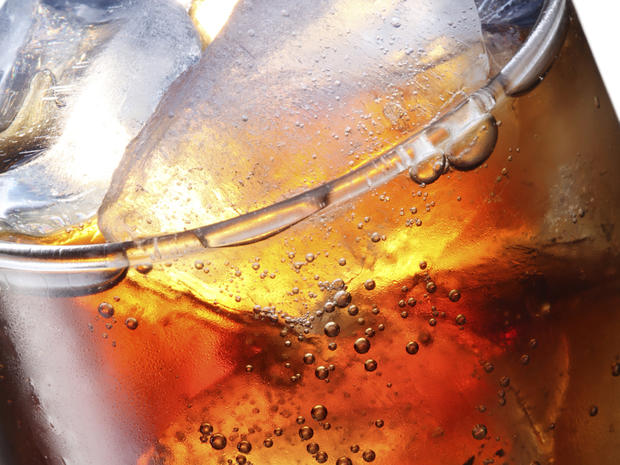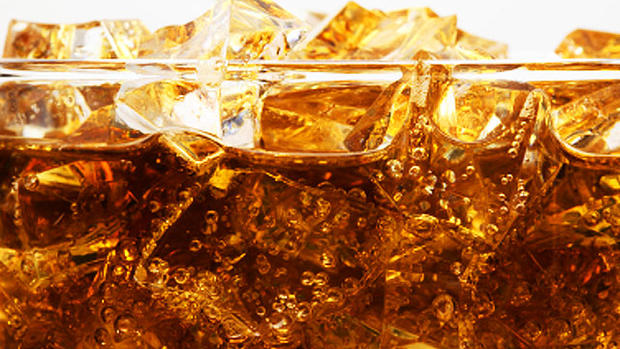Study of 33,000 people shows soda affects genes that control for weight gain
(CBS/AP) A huge, decades-long study involving more than 33,000 Americans has yielded the first clear proof that drinking sugary beverages interacts with genes that affect weight, amplifying a person's risk for obesity beyond what it would be from heredity alone.
Swapping sugary drinks out of teens' homes curbs weight gain, study finds
NYC Health Commissioner on soda ban: "We are just making healthy choices easier"
Pictures: New York City's ban on big sodas
This means the drinks may be especially harmful to people with genes that predispose them to weight gain - most people have at least some of these genes.
Led by the Harvard School of Public Health, the research was part of a much larger set of health studies that have gone on for decades across the U.S., led by the Harvard School of Public Health.
Researchers checked for 32 gene variants that have previously been tied to weight. Because people inherit two copies of each gene, everyone has 64 opportunities for these risk genes. The study participants had 29 on average.
Every four years, participants answered detailed surveys about their eating and drinking habits as well as things like smoking and exercise. Researchers analyzed these over several decades and found the more sugary drinks someone consumed, the greater the impact of the genes on the person's weight and obesity risk.
For every 10 risk genes someone had, the risk of obesity rose in proportion to how many sweet drinks the person regularly consumed. Overall calorie intake and lifestyle factors like exercise did not account for the differences researchers saw.
This means that people with genes that predispose them to be obese are more susceptible to the harmful effects of sugary drinks on their weight, said one of the study leaders, Dr. Frank Hu, a professor of nutrition and epidemiology at Harvard. The opposite also was true - avoiding these drinks can minimize the effect of obesity genes.
"Two bad things can act together and their combined effects are even greater than either effect alone," Hu said. "The flip side of this is everyone has some genetic risk of obesity, but the genetic effects can be offset by healthier beverage choices. It's certainly not our destiny" to be fat, even if people carry genes that raise this risk.
The research, along with several other studies published in today's New England Journal of Medicine, strengthens the case against soda and other sugary drinks as culprits in the obesity epidemic.
Sugary drinks are the biggest source of calories in the American diet, and they are increasingly blamed for the fact that a third of U.S. children and teens and more than two-thirds of adults are obese or overweight. Consumption of sugary drinks and obesity rates have risen in tandem - both have more than doubled since the 1970s in the U.S.
But until now, high-quality experiments have not conclusively shown that reducing sugary beverages would lower weight or body fat, said David Allison, a biostatistician who has done beverage research at the University of Alabama at Birmingham, some of it with industry support.
He said the new studies on children changed his mind and convinced him that limiting sweet drinks can make a difference.
In one study, researchers randomly assigned 224 Boston-area overweight or obese teens to receive shipments every two weeks of either the sugary drinks they usually consumed or sugar-free alternatives, including bottled water. After one year, the sugar-free group weighed more than 4 pounds less on average than those who kept drinking sugary beverages.
"A simple focused intervention based on one dietary product to be able to produce weight loss in one year suggests this has major public health potential," the study's author, Dr. David Ludwig, director of the New Balance Foundation Obesity Prevention Center at Boston Children's Hospital, told CBSNews.com.
A second study involved 641 normal-weight children ages 4 to 12 in the Netherlands who regularly drank sugar-sweetened beverages. They were randomly assigned to get either a sugary drink or a sugar-free one during morning break at their schools, and they were not told what kind they were given.
After 18 months, the sugary-drink group weighed 2 pounds (0.9 kilograms) more on average than the other group.
The studies "provide strong impetus" for policies urged by the Institute of Medicine, the American Heart Association and others to limit sugary drink consumption, Dr. Sonia Caprio, a professor of pediatric endocrinology at the Yale School of Medicine, wrote in an editorial in the journal.
The studies were also presented Friday at an obesity conference in Texas.
Collectively, the results strongly suggest that sugary drinks cause people to gain weight, independent of other unhealthy behavior such as overeating and getting too little exercise, scientists say.
The findings may mean more cities will follow the lead of New York City, which just adopted a ban on large sugary drinks over protests from the soda industry and people who objected to what they saw as government intrusion on personal choices.
The study was funded mostly by federal grants, with support from two drug companies for the genetic analysis.
The American Beverage Association disputed the study, saying sugar-sweetened beverages play a small and declining role in the U.S. diet.
"Obesity is a serious and complex public health issue facing our nation and the rest of the world, and we all must work together to solve it. We know, and science supports, that obesity is not uniquely caused by any single food or beverage," said the American Beverage Association in a statement. "Thus, studies and opinion pieces that focus solely on sugar-sweetened beverages, or any other single source of calories, do nothing meaningful to help address this serious issue."

